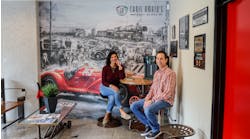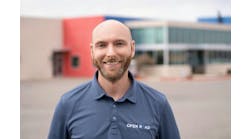As a Motor Age Top Shop, Arizona’s Tri-City Transmission sets itself apart from competitors by focusing on “diligence in serving the customers,” says owner Dave Riccio.
A key example of Riccio’s diligence is his emphasis on making sure that each customer’s vehicle is treated to the most effective fluid based on what works best in their particular model.
Serving the bustling metropolitan region that Phoenix has become, Tri-City takes its name from the shop’s centralized location amid the triangle of Tempe, Mesa and Scottsdale. “I grew up here, so I’ve watched all these towns grow into each other.”
Not surprisingly, transmissions take a beating in a desert climate where the mercury can climb to 115 degrees. “It gets smokin’ hot under that engine“Transmissions take on damage in the summer that doesn’t show up until the winter. December is my busiest month,” he says. “Transmission fluid expands and contracts with the temperature, and in the winter the fluid contracts and it fits through that hole.”
Each new customer undergoes a thorough interview to ascertain the exact nature of the problem and implement the correct course for the repair. “We have“We have found that the concept of specialization is completely foreign to most shops. I look at it just like a football team. We still cross train, but we never put the quarterback at the defensive line. There are just certain things you can’t switch up. My best employee is going to be the quarterback, but we still cross train because he has to go on vacation. We try to put people in the right role based on experience, proficiency and natural gifts. We’re a learning facility as well, which means that the quarterback will also take on a less experienced technician and coach him.”
Using PIF Pro shop management software from ProfitBoost, repair orders are bar-coded and each employee has an ID card with a bar code on it as well. “When they are working on a job they are able to scan the bar code into the system so that at any given time we can tell what each employee is working on and how much time it is taking,” says Riccio.
“Everything is based on time. We work on a gross profit per hour system instead of just gross profit system or the PIF (Profit Index Factor). Our costing is based on how much time a job actually takes based on all the data we have collected through PIF Pro. We know what our average is down to a hair on a particular job,” he says. “Time is a finite resource. We can’t buy more time. We work on adjusted capacity. Everybody communicates about the job through the PIF Pro system. I can get a snapshot in real time of what everyone is doing.”
Transmission repair is an auto repair specialty that requires extensive training and experience to achieve success, Riccio observes. “Because of that, we attend any transmission-related training that’s available from ATRA (Automatic Transmission Rebuilders Association), ATSG (Automatic Transmission Service Group), WorldPac and other vendors. We pay for our employees to take these training classes when there is a cost,” he notes.
“In addition, every year we take our key employees to ATRA’s Power Train Expo in Las Vegas. We take care of their expenses for their room, travel and entertainment as well as getting paid for their regular work day. The incentive to employees is that the more training they have, the better they will be on the job – which opens doors to advancement in position, pay and benefits. Of course, a free trip to Vegas is an incentive in itself!”
Choosing a path
Riccio’s ownership of Tri-City began with a devastating illness diagnosis. “In 2006 life was going well. I was 26 years old, happily married and had a precious newborn son. I also had a great sales career in the industrial heating, ventilation and air conditioning industry (HVAC). Then one day an event occurred that changed my life forever,” he recounts.
“It started out as any other day; I kissed my wife Cira (pronounced “Seeda”) and son and got into my car to go to work. However, when I tried to put the key in the ignition my hand was shaking so badly, I couldn’t do it. I also noticed that I had a very bad headache. I just figured that I had a migraine and called in sick to work that day. After a couple days when the headache and shaking didn’t get better, I went to the hospital. It took weeks of testing before a diagnosis was confirmed. I had Multiple Sclerosis (MS).”
Currently a new medication regimen has the condition under control, yet upon learning of the illness Riccio (pronounced “Richeo”) was filled with despair over how he would support his young family. Owning his own business was the way to go. But what? Automotive rather that HVAC became the chosen path.
“Since I can remember I have loved taking stuff apart and fixing it. At 16 years old I started working at one of Arizona’s largest tire franchises as a tire guy. By 22 years old I had moved up to become the manager of my store where I grew the shop’s revenue to over $1.2 million,” he recalls.
“Then it occurred to me that I had a couple of customers in my HVAC business who owned Tri-City Transmission and it looked to me like they were old enough to be retired. I asked them if they were interested in selling their business and they said they were. I just went to a bank and filled out a loan application. Long story short, I picked up the keys to Tri-City Transmission on Nov. 1, 2006. When I purchased the business sales were at $1.1 million. Over the course of nine years, even with the setback of the ‘Great Recession,’ I was able to grow sales to $1.8 million.”
The shop’s marketing plan is strategic and highly integrated, including referrals and networking, publicity, direct mail, radio advertising, website optimization, personal sales calls, on-site visits, telephone on-hold messaging, a 24-hour answering service, telephone follow-up, thank you notes, pizza and more.
“Because we do not do general auto repair, about 25 percent of our business comes through referrals from many of the 800 general automotive repair shops in the Phoenix area,” says Riccio. “We encourage referrals by the use of a sales representative who pays personal visits to the automotive shops in the area to build relationships. I personally go visit the shops as much as I can and in some cases provide transmission training for their staff.”
Radio spots have been particularly effective, and Riccio hosts a Saturday morning program called “Bumper to Bumper” that reaches a wide audience of auto aficionados.
A professional Internet presence is another plus. “Transmission repair can be an expensive and high-risk transaction, and therefore people are very unsure about who to trust. With that in mind, our No. 1 goal with our website is to convey trust so that people will call us to set an appointment. We build trust through the use of reviews, real faces of real people and education, and through answering the most important questions of our potential customers.”
Upfront pricing is a critical component because the technique helps avoid people who are merely clicking online for the cheapest deal.
“We don’t want that type of customer,” Riccio asserts. “We want the savvy customer who does good research and is looking for quality over price because while we’re not the most expensive transmission shop in Phoenix, we’re not the least expensive either.”






